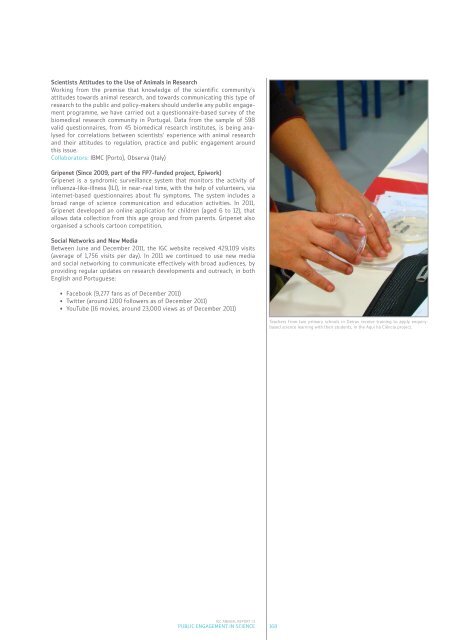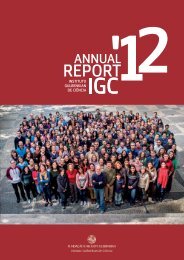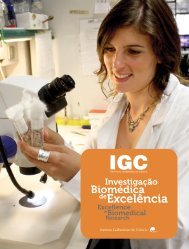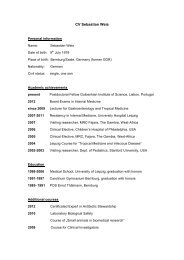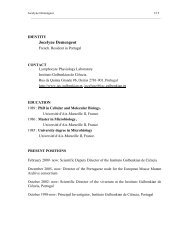organisation - the Instituto Gulbenkian de Ciência
organisation - the Instituto Gulbenkian de Ciência
organisation - the Instituto Gulbenkian de Ciência
- No tags were found...
You also want an ePaper? Increase the reach of your titles
YUMPU automatically turns print PDFs into web optimized ePapers that Google loves.
Scientists Attitu<strong>de</strong>s to <strong>the</strong> Use of Animals in Research<br />
Working from <strong>the</strong> premise that knowledge of <strong>the</strong> scientific community's<br />
attitu<strong>de</strong>s towards animal research, and towards communicating this type of<br />
research to <strong>the</strong> public and policy-makers should un<strong>de</strong>rlie any public engagement<br />
programme, we have carried out a questionnaire-based survey of <strong>the</strong><br />
biomedical research community in Portugal. Data from <strong>the</strong> sample of 598<br />
valid questionnaires, from 45 biomedical research institutes, is being analysed<br />
for correlations between scientists’ experience with animal research<br />
and <strong>the</strong>ir attitu<strong>de</strong>s to regulation, practice and public engagement around<br />
this issue.<br />
Collaborators: IBMC (Porto), Observa (Italy)<br />
Gripenet (Since 2009, part of <strong>the</strong> FP7-fun<strong>de</strong>d project, Epiwork)<br />
Gripenet is a syndromic surveillance system that monitors <strong>the</strong> activity of<br />
influenza-like-illness (ILI), in near-real time, with <strong>the</strong> help of volunteers, via<br />
internet-based questionnaires about flu symptoms. The system inclu<strong>de</strong>s a<br />
broad range of science communication and education activities. In 2011,<br />
Gripenet <strong>de</strong>veloped an online application for children (aged 6 to 12), that<br />
allows data collection from this age group and from parents. Gripenet also<br />
organised a schools cartoon competition.<br />
Social Networks and New Media<br />
Between June and December 2011, <strong>the</strong> IGC website received 429,109 visits<br />
(average of 1,756 visits per day). In 2011 we continued to use new media<br />
and social networking to communicate effectively with broad audiences, by<br />
providing regular updates on research <strong>de</strong>velopments and outreach, in both<br />
English and Portuguese:<br />
• Facebook (9,277 fans as of December 2011)<br />
• Twitter (around 1200 followers as of December 2011)<br />
• YouTube (16 movies, around 23,000 views as of December 2011)<br />
Teachers from two primary schools in Oeiras receive training to apply enquirybased<br />
science learning with <strong>the</strong>ir stu<strong>de</strong>nts, in <strong>the</strong> Aqui há Ciência project.<br />
IGC ANNUAL REPORT ‘11<br />
PUBLIC ENGAGEMENT IN SCIENCE<br />
168


